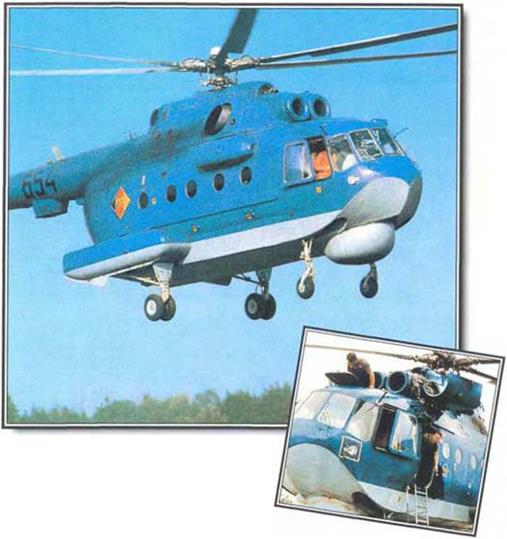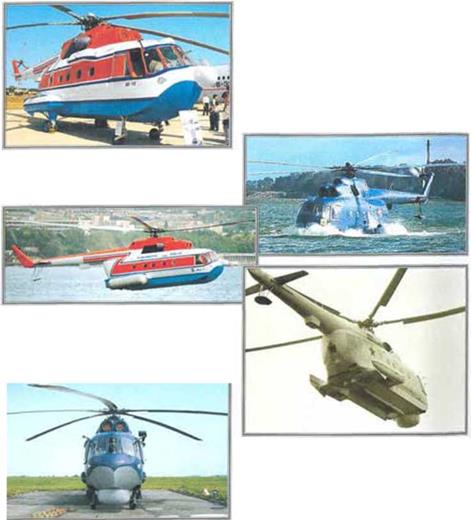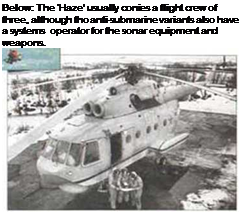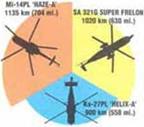Mi-14 ‘Haze’
• Twin-engined shore-based ASW/SAR helicopter • Exports

 Based on the Mi-8 ‘Hip’, the Mi-14 was developed as a land-based anti-submarine helicopter in the oarly-1970s. A boat hull and retractable landing gear were used to mako it suitable for amphibious operations, with more powerful engines compensating for tho additional weight. Flight tests started in September 1969. Specialised versions for minesweeping and search and rescue operations have also been produced.
Based on the Mi-8 ‘Hip’, the Mi-14 was developed as a land-based anti-submarine helicopter in the oarly-1970s. A boat hull and retractable landing gear were used to mako it suitable for amphibious operations, with more powerful engines compensating for tho additional weight. Flight tests started in September 1969. Specialised versions for minesweeping and search and rescue operations have also been produced.



▼ Upgraded Mi-14 demonstrator
To ‘drum up’ business, tho Russian aviation industry is offering upgrades for existing airframes.
▼ Land based
As featured on other maritime helicopters like the Sikorsky Sea King, the Mi-14 has a shaped hull to provide an amphibious capability.
A ‘Haze’ underside
This view of an Mi – 14’s underside shows the large weapons bay doors open and the MAD ’bird" deployed. Other apertures in tho rear of the fuselage house dipping sonar and include parachutes for sonobuoys and flares.
![]()
► Tho Mi-14PL ‘Haze-A’ ontored service In 1976, tho МІ-14ВТ ‘Haze-B’ followed In 1986 and the MI-14PS •Hazo-C’ In 1992.
► Poland was the only export customer for tho search-and-rescue MI-14PS.
► East Gorman Mi-14s were retired after tho German reunification.
The engino and gearbox from tho Mi-17, itsolf developed from the Mi-8, was installed in the Mi-14.
► Tho SAB ‘Hazo-B’ carries ten 20-place liferafts and can tow those whon filled.
>■ Mi-14PLs carry four crow: two pilots, a night engineer and a systems operator.
profile




![]()
Equipped willi ;i search radar, dipping sonar, dispensers for sonolniovs aild tl. irvs and a tewed magnetic jorinulv detector (MAD), the origin. il anti-submarine version of die Haze’ was the Mi l lI’L. The Mi-l iPLM is a later variant with an improved engine and lias the search radar moved to the hotdwn rear end ol the fuselage For minesweeping. the МИ iin lla/e-B’ has a mine – adivatlng sleil m place of the MAO lowed behind the helicopter, il carries either
electrical cables r>i noise generators ti> detonate magnetl. or acoustic mines Л searchlight on the tailboom enables the sled to Ik* launched and recovered ai night. The It I variant was used by the foniter East German navy as well as the Soviet naval air arm. altliougli only about is were ініііі T he l. ultwaffe did not keep the East German navy’s six Mi-1 dll’s after reunification. Some have been converted to water bombers for use in civilian fire figliling o|H5iations.
MM4PL ‘Haze-A*
Type: land-based anti-submanne hotcopter
Powerplanl: two 1434-RW (1.925-hp) Klimov (Isoiov) TV3-117MT turboshatts
Max speed: 230 kmfti (143 m p. h.) at sea level
Climb rate: 468 nVmm (1.535 f. p.m I at sea level
Endurance: 5 hours 55 mm
Range: It 35 Km (704 ml.) with maximum fuel
Weights: empty 8902 kg <19.584 lb£ loaded 13000 kg (28,600 so,); maximum take-off 14000 kg (30.800 lb.)
Armament: torpedoes and depth charges as well as sonobuoys.’smoke.’?lare floats
Dimensions:
mam rotor diameter 21.29 m (69 ft 10 in ) length 18.37 m (60 It. 3 in,)
height 9.63 m (31 ft 7 in.)
rotor disc area 362 m’ (3.895 sq, ft I
COMBAT DATA



![]()
![]()
![]()
![]()



![]()
![]()
![]()
 MAXIMUM SPEED
MAXIMUM SPEED
AwcraП ike tho Mi-14 wore not mter»Jod to bi txgh-Bpe«d mocNnan rjnjo and mdurarce w*m more important factor* AJ trvee types ere «paw* of *рем>» n tho 2S0 Knvh П50 m. phl band
МИ4П НАЛ-A" 230 tti’h. S—
(Ш M ».k |
|
|
|
SA 321C SUPER milON |
|
Xi-2?n HUIX-A’ 250 «nvh (155 m. p.B.) |
ENDURANCE
!»<• tareHJOMd M-14 fun »» (ям «nduanoo of »we «epmentettai!)p*v ‘H«4U’ is з «тилу comer-baiet) madvio, iwuJ ihu Supo> fmton tun, siroo ongme* and я Higher fuel ооплтлсп
![]()
![]()
 МІ-14Л НАЛА’ 5 tour* 55 nln
МІ-14Л НАЛА’ 5 tour* 55 nln
The endurance of MOh type » «fkKWO
Dy the гяпцв »фіп»
Пі» vttluo* quoted ore »Of terry reoo* xifn a nannurn fuel ЮМ and ro weapons or other equipment on poor] Rang* імПслпаnee n parttCuUrty important lor cnmer-ISMed nrcrafl
![]()
Mil











